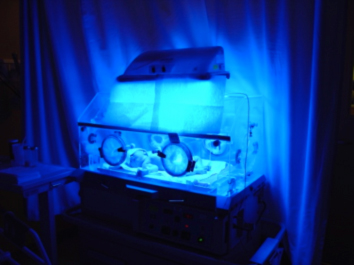Category — 2.2 Children with Biological Risk Conditions: Born Premature
Born Premature
In this section, the most common biological risk conditions will be briefly described. You will learn about the characteristics of these conditions. You will also learn about the most common intervention options. To learn more about biological risk, please refer to the birth to six section of this course.
In this course, biological risk conditions will include the following:
- Premature birth;
- Small for gestational age;
- Low birth weight;
- Having a low Apgar score;
Premature birth: children born at or before 37 weeks of gestation are considered premature infants. Premature infants often spend time in the neonatal intensive care unit and may need additional medical treatment before they can go home. Some of these babies cannot breathe on their own when they are born and may need help breathing from machines. Others may have pressing medical conditions, such as cardiac problems (Fig. 1).
Figure 1. Cardiac problems
Small for Gestational Age (SGA): children who were born SGA babies that were carried to term but who were born very small. They may look like a preterm baby because they are very small and have low birth weight, but they are not born prematurely. They simply did not grow as well or as fast as they should have while in utero. This is called intra-uterine growth retardation by professionals in the medical field. There are a number of reasons a child may be small and may include:
- Prenatal exposure to alcohol and/or drugs;
- Prenatal exposure to nicotine (cigarettes);
- Mother following a severely restricted diet while pregnant;
- Maternal infection while pregnant;
- Mother being under extreme amounts of stress throughout her pregnancy;
- Being born to a mother who is over 40 or under 18 years of age;
- Sometimes the causes of being born SGA are unknown.
Children who are born premature and/or are SGA are considered at biological risk developmentally because they were born under less than ideal situations. Some children develop well. Others are slow to reach developmental milestones, such as sitting and walking. Some have medical conditions, others do not. As they grow older, many children who are born premature and/or are SGA catch up with their typically developing peers in all aspects of development. Others do not. Those who do not can have the following characteristics:
- Delays in cognitive development: some children continue to display delays, compared to their peers, in all areas related to cognitive development. They may be slower to respond to others, may process information slowly and may seem to struggle with abstract and/or complex terms and directions;
- Delays in the development of academic skills: some of these children will need help in all academic areas, including reading, writing and math;
- Delays in the development of language and communication skills: some children may be late to achieve language and communication milestones. They may struggle with their language skills, even after they reach school age. Some may have a smaller vocabulary than that of their typically developing peers;
- Delays in the achievement of motor milestones: many children are late to sit up, walk and run. When they reach school age, they may appear a bit clumsy. They may struggle with activities that involve the use of their large muscles (for example, using the slides and swings on the playground). Others may experience fine motor difficulties, such as difficulties with writing;
- Delays in the development of social/emotional skills: some of these children will struggle in social situations and may not know how to respond to others. This may be caused by their slightly immature cognitive and language skills.
Some children who were born premature, especially those who were born very premature (below 30 weeks of gestation), and those who were born very small for their gestational age, may have one (or more) of the following diagnoses:
Some children who are born premature and/or are SGA will continue to have medical difficulties. Many will need to see specialists in the medical field well into their school and even high school years.
Because of the difficulties described above, some children who were born premature and/or were SGA could benefit from the following services:
- Special education assistance: in school, some of these children may require the help of the school’s special educator. These children are not usually placed on an Individual Education Plan (IEP) unless they are diagnosed with one of the conditions listed above. But that does not mean that they do not need help. They may need a lot of help with academic skills, paying attention, and following directions. They can often get this help from the school’s special educator;
- Speech and language pathologist (SLP): some of these children may continue to need the help of an SLP well into their school years. That is because some children continue to display language delays compared to their peers, especially when it comes to expressive and receptive language skills. An SLP will help these children improve their receptive and expressive language skills and increase the size of their vocabulary;
- Behavioral interventionist (BI): some of these children may need help managing their behavior. Some may engage in extreme behaviors, such as severe temper tantrums, and may need the help of a BI in order to learn how to manage these extremes in behavior;
- Occupational therapy (OT): some of these children may struggle with sensory integration. Those who do may need the help of an OT who would help them with these difficulties. OTs can also help children who are born premature improve their fine motor skills;
- Vision specialist: some of these children will have vision problems. Their vision may need to be monitored by an ophthalmologist. Those who do not have vision problems may still need regular visits with an ophthalmologist even if their vision is fine. This is usually just a precaution, but some general practitioners and/or pediatricians will recommend it;
- Hearing specialist: some of these children will have hearing problems and their hearing may need to be monitored by an audiologist. Those who do not have hearing problems may still need regular visits with an audiologist, even if their hearing is fine. This is usually just a precaution, but some general practitioners and/or pediatricians will recommend it;
- Orthopedist: some of these children will need the services of an orthopedist or orthopedic surgeon because of problems with their bones;
- Cardiologist: some of these children may have heart problems and may need to be monitored closely by a pediatric cardiologist (Fig. 2).
Figure 2. Pediatric cardiologist
Some children who are born premature and/or are SGA continue to experience difficulties well into their middle childhood years. Many others do not. Many do catch up with their peers fully and go on to lead very fulfilling, healthy and happy lives (Fig. 3).

Figure 3. Happy life
see References
http://www.lifeslittletreasures.org.au/
http://www.childrenshospital.org/az/Site1616/mainpageS1616P0.html
http://www.nlm.nih.gov/medlineplus/prematurebabies.html
June 11, 2012 No Comments

